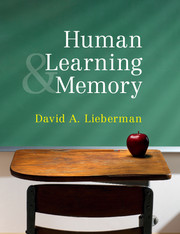12 - Practical applications
from Part II - Memory
Summary
What's the best way to remember the name of someone you've just met? To memorize vocabulary in a foreign language or remember the material in a textbook?
Or, in the context of the legal system, to know how much confidence to place in the testimony of an eyewitness to a crime? And what if that testimony comes from an adult who has accused her father of sexually abusing her when she was a child, despite having had no memory of the abuse during the intervening years – could someone really forget such a traumatic experience and then suddenly remember it decades later? These are some of the questions we'll try to answer in this chapter as we look at how psychologists have tried to apply the understanding of memory gained in the laboratory to the far more complex and even chaotic conditions of real life.
- Type
- Chapter
- Information
- Learning and Memory , pp. 441 - 474Publisher: Cambridge University PressPrint publication year: 2011



